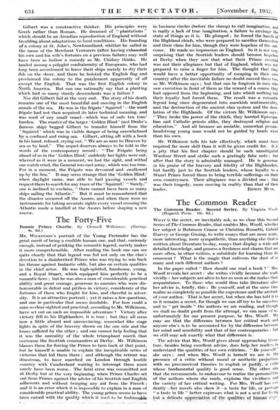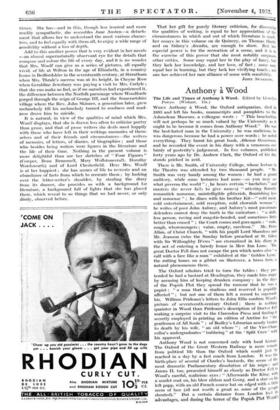The Common Reader
The Common Reader. Second Series. By Virginia Woolf-, (Hogarth Press. 10s. 6d.) WHAT is the secret, We inevitably ask, as we close this Second Series of The common Reader, that enables Mrs. Woolf, whether her subject is Robinson Crusoe or Christina Rossetti, Gabriel Harvey or George Gissing, to write essays that are more acute, more interesting, more sympathetic, than anything else that is written about literature to-day, essays that display a wide and detailed knowledge, and possess a freshness and charm that are more often, in other writers, a substitute for learning than its ornament ? What is the magic that enlivens the dust of so many and such different authors ?
In the paper called "How should one read a book ?• Mrs. Woolf reveals her secret : she writes vividly because she reads vividly : her subjects are alive to her as soon as she makes their acquaintance. To those who would thus take literature alive her advice is, briefly, this : Be yourself, and at the same time realize as completely as possible the experience and the attitude of your author. That is her secret, but when she has told it to us it remains a secret, for though we can all try to be ourselves and to "get inside" the authors we are reading, and though we shall no doubt profit from the attempt, we can none of us, unfortunately- for our present purpose, be Mrs. Woolf. We may see that the difference between her critical work and anyone else's is to be accounted for by the difference between her mind and sensibility and that of her contemporaries ; but
• we still may-ask exactly what that difference is.
The advice that Mrs. Woolf gives about approaching liter5. ture, besides being excellent advice, does help her readers to understand the qualities of her own criticism. "Be yourself," she says ; and when Mrs. Woolf is herself we are in the presence of a critic without moral or aesthetic prejudices, with no preconceived theories to exploit., or justify,. a critic whose fundamental quality is good sense. The other aim that she recommends, to endeavour to realize the personalities of the authors whom she reads, explains the vividness and the variety of her critical writing. For Mrs. Woolf has evi- dently—her novels also show it—a taste for life, or perhaps "a taste in life" better expresses what is not a zest for living but a delicate appreciation of the qualities of human eNPe-
rience. She has—and in this, though less ironical and more readily sympathetic, she resembles Jane Austen—a detach- ment that allows her to understand the most various charac- ters, and to feel equally with them all, to enjoy a wide range of ;sensibility without a loss of depth.
Add to this another power that is very evident in her novels almost supernaturally observant eye for the details that compose and colour the life of every day, and it is no wonder that Mrs. Woolf can give us a series of pictures, all equally vivid, of life at Wilton in the age of Elizabeth, in a country house in Bedfordshire in the seventeenth century, at Streatham when Mrs. Thrale's success was at its height, in Cheyne Row when Geraldine Jewsbury was paying a visit to Mrs. Carlyle ; that she can make us feel, as if we ourselves had experienced it, the difference between the Norfolk parsonage where Woodforde gorged through the reign of George III, and the Somersetshire village where the Rev. John Skinner, a generation later, grew melancholy till his melancholy turned to madness and mad- ness drove him to suicide.
It is natural, in view of the qualities of mind which Mrs. Woolf displays, that she is drawn less often to criticize poetry than prose, and that of prose writers she deals most happily with those who have left in their writings memories of them- selves and of their friends and circumstances—the writers of memoirs, of letters, of diaries, of biographies ; and those who besides being writers were figures in the literature and the life of their time. Nothing in the present volume is more delightful than are her sketches of " Four Figures" (Cowper, Beau Brummell, Mary Wollstonccraft, Dorothy Wordsworth) and of Lord Chesterfield. Here Mrs. Woolf is at her happiest ; she has scenes of life to recreate and an abundance of facts from which to recreate them ; by looking over the letter-writer's shoulder, by stealing the diary from its drawer, she provides us with a background for literature, a background full of lights that she has placed there, which reveal to us things that we had never, or only .dimly, observed before.
That her gift for purely literary criticism, for discern: the qualities of writing, is equal to her appreciation of the circumstances in which and out of which literature is made, her essays in this volume on de Quincey, on Thomas Hardy and on Sidney's Arcadia, are enough to show. But her especial power is for the recreation of a scene, and it is in the exercise of this power that she most notably surpasses, other critics. Some may equal her in the play of fancy, but they lack her knowledge, and her love, of fact ; some may equal her in learning, but they lack her vivifying touch ; not one has achieved her rare alliance of sense with sensibility.
JOHN SPARROW,











































 Previous page
Previous page